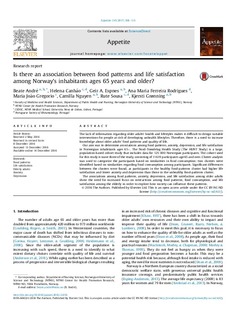Is there an association between food patterns and life satisfaction among Norway's inhabitants ages 65 years and older?
André, Beate; Canhão, Helena; Espnes, Geir A.; Ferreira Rodrigues, Ana Maria; Gregorio, Maria João; Nguyen, Camilla; Sousa, Rute; Grønning, Kjersti
Journal article

Åpne
Permanent lenke
http://hdl.handle.net/11250/2491256Utgivelsesdato
2017Metadata
Vis full innførselSamlinger
Originalversjon
André, B., Canhão, H., Espnes, G.A., Ferreira Rodrigues, A.M., Gregorio, M.J., Nguyen, C., Sousa, R., & Grønning, K. (2017). Is there an association between food patterns and life satisfaction among Norway's inhabitants ages 65 years and older? Appetite, 110:108-115. 10.1016/j.appet.2016.12.016Sammendrag
The lack of information regarding older adults' health and lifestyles makes it difficult to design suitable interventions for people at risk of developing unhealth lifestyles. Therefore, there is a need to increase knowledge about older adults’ food patterns and quality of life.Our aim was to determine associations among food patterns, anxiety, depression, and life satisfaction in Norwegian inhabitants ages 65+. The Nord-Trøndelag Health Study (The HUNT Study) is a large, population-based cohort study that includes data for 125 000 Norwegian participants. The cohort used for this study is wave three of the study, consisting of 11 619 participants age 65 and over. Cluster analysis was used to categorize the participants based on similarities in food consumption; two clusters were identified based on similarities regarding food consumption among participants. Significant differences between the clusters were found, as participants in the healthy food-patterns cluster had higher life satisfaction and lower anxiety and depression than those in the unhealthy food-patterns cluster.The associations among food patterns, anxiety, depression, and life satisfaction among older adults show the need for increased focus on interactions among food patterns, food consumption, and life satisfaction among the elderly in order to explore how society can influence these patterns.
